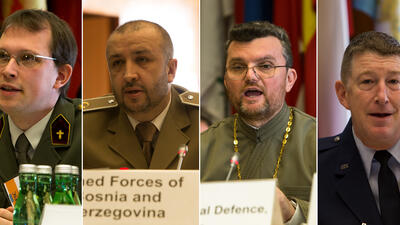-
Our work
-
Fields of work
- Arms control
- Border management
- Combating trafficking in human beings
- Conflict prevention and resolution
- Countering terrorism
- Cyber/ICT Security
- Democratization
- Economic activities
- Education
- Elections
- Environmental activities
- Gender equality
- Good governance
- Human rights
- Media freedom and development
- Migration
- National minority issues
- Policing
- Reform and co-operation in the security sector
- Roma and Sinti
- Rule of law
- Tolerance and non-discrimination
- Youth
- Field operations
- Projects
-
Meetings and conferences
- Summit meetings
- Review Conferences
- Ministerial Council meetings
- Plenary meetings of the Permanent Council
- Plenary Meetings of the Forum for Security Co-operation
- Security Review Conferences
- Annual Implementation Assessment Meetings
- Economic and Environmental Forum
- Economic and Environmental Dimension Implementation Meetings
- Human rights meetings
- Media conferences
- Cyber/ICT security conferences
- Conference of the Alliance against Trafficking in Persons
- Gender equality conferences
- Annual OSCE Mediterranean conferences
- Annual OSCE Asian conferences
- Partnerships
-
Fields of work
-
Countries
- All
-
Participating States
- Albania
- Andorra
- Armenia
- Austria
- Azerbaijan
- Belgium
- Belarus
- Bosnia and Herzegovina
- Bulgaria
- Canada
- Croatia
- Cyprus
- Czechia
- Denmark
- Estonia
- Finland – OSCE Chairpersonship 2025
- France
- Georgia
- Germany
- Greece
- Holy See
- Hungary
- Iceland
- Ireland
- Italy
- Kazakhstan
- Kyrgyzstan
- Latvia
- Liechtenstein
- Lithuania
- Luxembourg
- Malta
- Moldova
- Monaco
- Mongolia
- Montenegro
- The Netherlands
- North Macedonia
- Norway
- Poland
- Portugal
- Romania
- Russian Federation
- San Marino
- Serbia
- Slovakia
- Slovenia
- Spain
- Sweden
- Switzerland
- Tajikistan
- Türkiye
- Turkmenistan
- Ukraine
- United Kingdom
- United States of America
- Uzbekistan
- Asian Partners for Co-operation
- Mediterranean Partners for Co-operation
-
Structures and institutions
- Chairpersonship
-
Secretariat
- Secretary General
- Office of the Secretary General
- Conflict Prevention Centre
- Transnational Threats Department
- Office of the Special Representative and Co-ordinator for Combating Trafficking in Human Beings
- Office of the Co-ordinator of OSCE Economic and Environmental Activities
- Gender Issues Programme
- Opportunities for Youth
- Department of Human Resources
- Department of Management and Finance
- Office of Internal Oversight
- Documentation Centre in Prague
- Institutions
-
Field operations
- Presence in Albania
- Centre in Ashgabat
- Programme Office in Astana
- Programme Office in Bishkek
- Mission to Bosnia and Herzegovina
- Programme Office in Dushanbe
- Mission in Kosovo
- Mission to Moldova
- Mission to Montenegro
- Mission to Serbia
- Mission to Skopje
- Project Co-ordinator in Uzbekistan
- Closed field activities
- Parliamentary Assembly
- Court of Conciliation and Arbitration
- Organizational structure
- About us
Press release
OSCE Forum for Security Co-operation debates freedom of belief in the armed forces

- Date:
- Place:
- VIENNA
- Source:
- Forum for Security Co-operation
- Fields of work:
- Conflict prevention and resolution
VIENNA, 15 February 2016 – The role of military chaplains in ensuring armed forces’ compliance with the OSCE Code of Conduct on Politico-Military Aspects of Security’s commitments in regard to human rights was in the focus of today’s discussion in the Forum for Security Co-operation (FSC), currently under Romania’s Chairmanship.
The Code is a unique OSCE instrument for developing mechanisms of democratic civilian control over the armed forces, security forces, intelligence services, police, private security and paramilitary forces. It contains provisions committing each participating State to ensuring that military, paramilitary and security forces personnel are able to enjoy and exercise their human rights and fundamental freedoms.
Ion Ilinca, Military Priest in the Department for Religious Assistance of Romania’s Ministry of National Defence, said that military chaplains “not only provide religious and pastoral care, but also advise commanders on how to deal with the complexities of religion with regard to their personnel and mission.”
As the armed forces reflect the religious diversity of societies, it is important for military chaplains to be able “to work in a pluralistic religious environment, respecting and accommodating members of all faiths,” Ilinca said.
Chief Imam Nesib Hadžić of the Armed Forces of Bosnia and Herzegovina shared the experience of his country, explaining that the united military religious service consists of the Office of the Military Mufti, the Office of Military Bishop and the Office of Chief of Orthodox Military Service, representing Muslims, Roman Catholics and Orthodox communities.
Hadžić noted that military chaplains help to promote tolerance and understanding within military forces that include different ethnic groups, as is the case in his country.
Other speakers included Stefan Gugerel, Military Chaplain and Director of the Institute for Religion and Peace of the Military Ordinariate, Austria, and Colonel George Youstra, Chief of Religious Affairs of the United States Air Force.